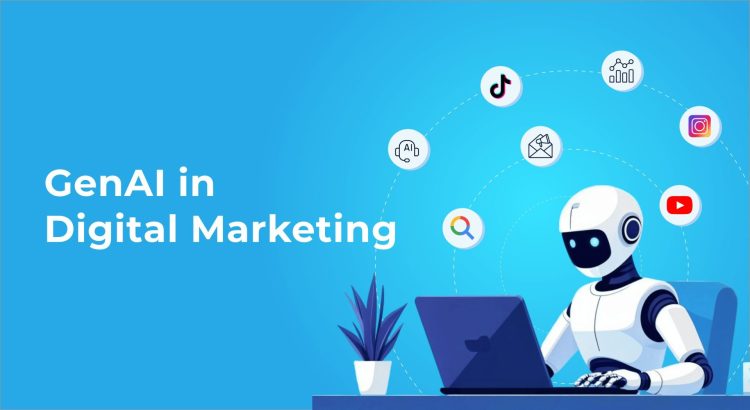To gain deeper insights into how generative AI is transforming digital marketing, we posed a series of questions to our digital marketing expert, Arun Chakravarthy. We explore how content, SEO, and personalized marketing are all set to change.
Q: How has the role of AI in digital marketing evolved, and what makes the current era particularly significant?
AI has always had a presence in digital marketing. It has been helping marketers in web analytics, advertising, and email marketing, leveraging a growing volume of data. With generative AI, we are entering a new, fascinating era.
Traditionally, when you had a new product, you would create a clever copy, figure out the best SEO and social media strategy, and set up targeted ads and email campaigns. Generative AI is changing how digital marketers go about doing these things.
Let’s take the case of content creation. With tools like ChatGPT, marketers can brainstorm ideas quickly, come up with catchy ad copies, and create personalized emails and interesting social media posts.
Q: In what areas of digital marketing are we seeing the most impact?
From where we are now, dramatic changes are happening in three key areas: Content creation and consumption, search engine optimization (SEO), and hyper-personalization.
Dramatic changes are happening in three key areas: Content creation and consumption, search engine optimization (SEO), and hyper-personalization.
AI is not just accelerating content production (text, images, and video) but also increasing competition and forcing content creators and brands to focus on unique and high-quality content.
AI-driven search (like Google's SGE and GPT-based search engines) is reducing reliance on traditional organic ranking strategies, making SEO more about content relevance, user intent, and AI optimization rather than just keywords and backlinks.
Traditional personalization methods, such as basic segmentation, are no longer sufficient. Brands, as well as customers, expect hyper-personalized content. AI-powered tools are capable of delivering it in real time.
Q: How will the shift toward AI-based content creation and consumption impact marketing?
The shift presents both a challenge and an opportunity for content marketers.
While AI can produce a vast amount of content, there’s the risk of drowning in it. The challenge is not in creating content but in ensuring it stands out in a sea of AI-generated material. This means focusing on quality (rather than quantity) and being laser-focused on user intent.
The challenge is not in creating content but in ensuring it stands out in a sea of AI-generated material.
There is also a growing preference for short-form video content, as platforms like TikTok, Instagram, and YouTube Shorts dominate user engagement. This calls for a shift in content formats. AI-powered video generators can enable content marketers to create good quality, personalized videos at scale.
There is a growing preference for short-form video content.
As AI continues to advance, content will be tailored to individual user preferences and delivered through automated channels, requiring marketers to understand and leverage these trends.
There could also be content creation for training AI agents. Instead of just producing content, domain experts may contribute specialized knowledge to train AI agents. For example, data analysts can collaborate to source content to train an AI agent for automated data analysis.
There are some unknowns as well!
GenAI tools like ChatGPT can only access and process existing content. New content is constantly needed to provide fresh insights and perspectives.
The second important question is, how will content creators be incentivized if platforms use their content to generate AI responses? Historically, website owners have monetized content through advertising, referrals, and partnerships. How will this dynamic change? The answers to these questions are still unfolding.
Q: Is AI-driven search actually a thing?
It is! AI is changing how people search for and consume content.
When researching, I often go straight to ChatGPT, similar to how I'd go to a knowledgeable person. I might have ten specific questions, and while I might not find a single article addressing all of them on Google, ChatGPT can consolidate that information for me. If I ask it for details on SEO covering specific points or about user sentiments about a product based on online reviews, it can usually address them all.
This raises questions about the future of online content. If AI can compile existing information so effectively, why would someone spend hours researching across multiple websites?
If AI can compile existing information so effectively, why would someone spend hours researching across multiple websites?
Q: How will GenAI-generated content impact SEO?
Google’s algorithms are constantly evolving to sift through the content flooding the web. With GenAI lowering the barrier to creating keyword-optimized and personalized material, there is an unprecedented surge in online content.
Yet, as AI churns out content, Google faces the challenge of distinguishing truly valuable content from mere keyword-stuffed fluff. It is continuously improving its algorithm to analyze the Experience, Expertise, Authoritativeness, and Trustworthiness (EEAT) of websites using AI models. This means marketers need to be smarter about how they leverage AI for SEO. More than just hitting the right keywords, they have to deliver real value.
Marketers need to be smarter about how they leverage AI for SEO—more than just hitting the right keywords, they have to deliver real value.
At QBurst, we help marketers optimize content to rank effectively on GPT-based search platforms. By leveraging AI-driven content strategies, we ensure that our clients' content is structured, contextually relevant, and enriched with authoritative insights. Our approach includes optimizing for natural language queries, integrating conversational SEO techniques, and aligning with AI search algorithms to enhance discoverability. This enables brands to surface as trusted sources when users seek information through AI-powered assistants.
Q: What is AI-enabled hyper-personalization?
Personalization (tailoring content to individual preferences) is becoming sophisticated with GenAI. It's applicable across various touchpoints, from website content to advertising.
Personalization is becoming sophisticated with GenAI. It's applicable across various touchpoints, from website content to advertising.
When you visit a website, you might see content dynamically adjusted to your preferred formats. Where you might see a listicle, another user might see a narrative version of the same content. While some tools offer this now, it's an area of ongoing development.
Email is a prime example of where hyper-personalization is already making waves. Previously, personalization relied on broad segmentation based on demographics, user interaction, purchase history, and other available data. Within a given segment, AI can analyze individual content consumption patterns, preferences, and other granular data to create highly tailored emails with customized text, images, CTA, etc.
Email is a prime example of where hyper-personalization is already making waves. Advertising is another.
Advertising is another area ripe for hyper-personalization. Traditional online advertising often relies on keywords, user intent, and demographics. While platforms like Google have evolved to incorporate A/B testing of ad creatives, GenAI enables greater personalization. With access to vast amounts of user data, platforms can now create ads with custom text and images designed to appeal to specific individuals, which allows for highly targeted advertising.
At QBurst, we utilize the AI capabilities of platforms like Adobe Campaign, SFMC, and Hubspot to dynamically adapt email content, recommendations, and visuals based on real-time customer data (for example, purchase history, browsing behavior, location, and a combination of many such touchpoints). This ensures that every email resonates with the individual recipient.
At QBurst, we utilize the AI capabilities of platforms like Adobe Campaign, SFMC, and Hubspot to dynamically adapt email content, recommendations, and visuals based on real-time customer data.
Q: Will GenAI eliminate certain marketing jobs, or will it primarily shift the focus and responsibilities of marketers?
Generative AI is going to transform marketing jobs, not eliminate them. The how of marketing will change significantly, not its fundamental principles. History offers numerous examples of technological advancements that initially sparked fears of job losses but ultimately led to the creation of new roles and opportunities. Rather than killing jobs, computers and the internet created entirely new fields like SEO. Spreadsheets, once seen as a threat to accountants, are now a widely used tool in just about every discipline.
With GenAI, we'll likely see a similar evolution. GenAI can act as a powerful assistant, enabling marketers to scale their efforts and personalize campaigns at an unprecedented level. The future of marketing will be driven by humans but with the added power of AI.
The future of marketing will be driven by humans but with the added power of AI.
Q: What steps should businesses take to remain competitive in this changing landscape?
The changes we discussed above only represent the current state of the landscape. A lot more is bound to happen. To stay ahead, businesses must move from traditional SEO to AI-driven approaches, cater to new consumption patterns, and hyper-personalize the experience for customers.
Now is the time to implement these new approaches and gain a first-mover advantage!


